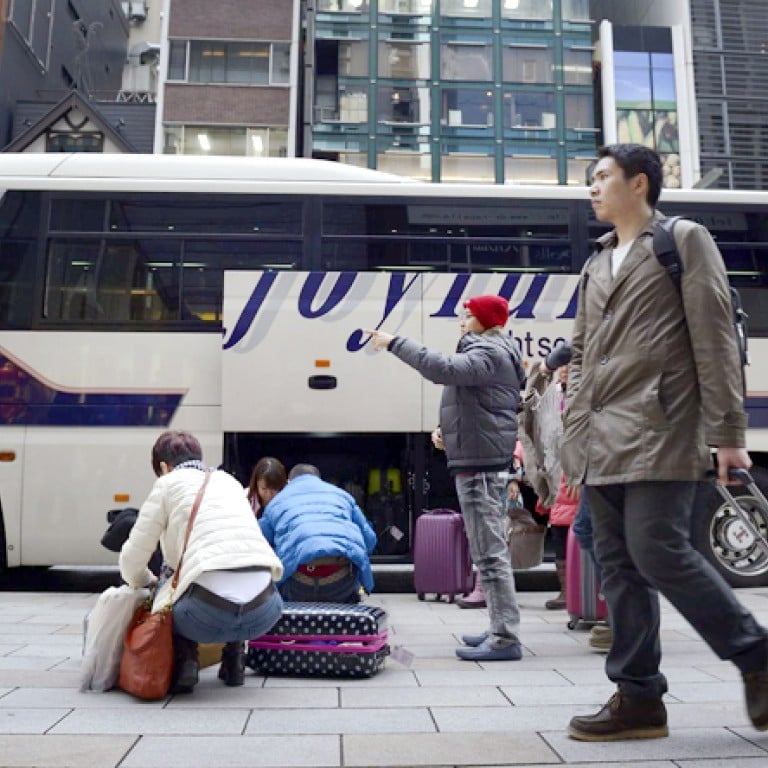
Chinese tourists continue their love affair with Japan despite frosty ties
Diplomatic ties may have hit rock bottom, but tourism is booming
The enthusiasm of mainland Chinese travellers for Japan hit a record high during the Lunar New Year holiday, despite the frosty ties between Beijing and Tokyo.
Japan issued 79,000 visas for mainland Chinese group tourists last month and more than 30,000 for individual visitors, the highest number since Japanese Prime Minister Shinzo Abe took office in December 2012. The total number represents a tenfold increase on the same period last year.
"I just don't think that most Chinese people care about the political issues anymore," said Masaki Hirata, executive director of the Japan National Tourism Organisation office in Hong Kong. "They have got used to the political tensions and are tired of the disputes. They just want to travel."
Hirata said people working for state-run enterprises still refrained from visiting Japan, possibly for political reasons.

In August 2012, Japan issued 107,621 visas to mainland Chinese tourists. The next month Abe, as head of the Liberal Democratic Party heading into the national election, advocated that Tokyo take a tougher line in its territorial rows with China.
Two months later, just 4,208 visas were issued.
But the fascination of mainland Chinese tourists with Japanese culture and products was again evident in the latter half of last year after the monthly number of visas stabilised at about 60,000 from July.
Abe's controversial visit to the Yasakuni war shrine on December 26 had little impact.
Meanwhile, Hong Kong travellers have also regained their confidence in visiting Japan after the massive earthquake three years ago. The Japan Tourism Agency said more than 740,000 Hongkongers visited Japan last year, compared with 480,000 in 2012.
A traveller from Beijing said he was not concerned about possible hostility from Japanese people towards mainland Chinese due to territorial disputes when he joined a six-day tour to Hokkaido on January 31.
"Tokyo cannot speak for the Japanese people," he said. "Given my previous encounters with Japanese people, I don't think their view of China is tainted by government propaganda.
"The Japanese are always polite. Their behaviour towards you does not depend on where you are from but on how they are taught to behave."
The traveller admitted he was surprised by the increase in mainland Chinese tourists in Hokkaido. When he travelled to the far northern island two years ago, he barely heard any tourists speaking Chinese. This time he encountered a dozen vans carrying camera-wielding mainlanders at one of the island's volcanos.
Makoto Watanabe, a lecturer in communications at Hokkaido Bunkyo University, said a growing number of mainland Chinese had been attracted by Japanese culture since China began opening up. He said mainland Chinese tour groups took in everything from visiting hot springs to shopping in Tokyo's upmarket Ginza district.
Retailers are particularly pleased to see the return of free-spending mainland Chinese tourists.
Sales at three Isetan department stores in Tokyo rose a remarkable 400 per cent between January 31 and February 6 over a year earlier, a spokeswoman for the luxury-end retailer said Mainland Chinese customer numbers were also up, by 325 per cent on last year.
Coral jewellery was in significant demand, she said, along with other fashionable purchases, including a cast-iron kettle and brand-name towels.
Ma Ning, a high school teacher from Beijing who travelled across the Kansai region of central western Japan during the holidays, said he had been greeted by Chinese-speaking shop assistants in duty-free stores.
"The 24-hour supermarket I visited before returning to Beijing even broadcast a notice in Chinese saying Japan was gripped by a recession and that tourists were welcomed to purchase more," he said. "No such notice was broadcast in Japanese," added Ma, who learnt basic Japanese from a brother working in Japan.
The traveller from Beijing agreed, saying most of his friends who went to Japan spent more than US$1,000 on souvenirs, especially luxury food items.
He said his Japanese friends were as impressed with the deep pockets of mainland Chinese as they were unimpressed with their loud manners. "Chinese consumers are welcomed in Japan, but they will be even more welcome if they can keep their voices down and wait in line, my Japanese friends said," he said.

